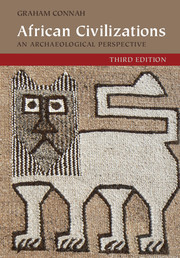Book contents
- Frontmatter
- Dedication
- Contents
- List of figures
- Preface and acknowledgements
- 1 The context
- 2 Origins: social change on the lower Nile
- 3 The Mediterranean frontier: North Africa
- 4 Sudanic genesis: Nubia
- 5 Isolation: the Ethiopian and Eritrean Highlands
- 6 Opportunity and constraint: the West African savanna
- 7 Achieving power: the West African forest and its fringes
- 8 Indian Ocean networks: the East African coast and islands
- 9 Cattle, ivory, and gold: social complexity in Zambezia
- 10 Central Africa: the Upemba Depression, Interlacustrine Region, and Far West
- 11 Settlement growth and emerging polities: South Africa
- 12 What are the common denominators?
- References
- Index
2 - Origins: social change on the lower Nile
Published online by Cambridge University Press: 05 November 2015
- Frontmatter
- Dedication
- Contents
- List of figures
- Preface and acknowledgements
- 1 The context
- 2 Origins: social change on the lower Nile
- 3 The Mediterranean frontier: North Africa
- 4 Sudanic genesis: Nubia
- 5 Isolation: the Ethiopian and Eritrean Highlands
- 6 Opportunity and constraint: the West African savanna
- 7 Achieving power: the West African forest and its fringes
- 8 Indian Ocean networks: the East African coast and islands
- 9 Cattle, ivory, and gold: social complexity in Zambezia
- 10 Central Africa: the Upemba Depression, Interlacustrine Region, and Far West
- 11 Settlement growth and emerging polities: South Africa
- 12 What are the common denominators?
- References
- Index
Summary
The earliest example of social complexity in Africa was along the lower valley of the River Nile. Some of the first indications have been found at Hierakonpolis, on the west bank of the Nile in southern Egypt, where extensive habitation and cemetery sites date to the fourth millennium BC. This and other sites suggest that social changes were already taking place amongst the formerly dispersed agropastoral people of the region. Local elites were emerging, and by about 3000 BC there is evidence for the First Dynasty of Pharaonic rulers of ‘Ancient Egypt’. This polity has long occupied a special place in Western consciousness, both scholarly and public. Pharaonic Egypt has been regarded as one of the great ‘civilizations’, as an almost mythical construct and treated as separate from the overall study of Africa's past. However, archaeologists are now considering Egypt in its African context, for example, O'Connor and Reid (2003b) and Exell (2011), but for a long time this was not done. It was insisted that Egypt during the last three millennia BC demanded extensive archaeological investigations, but until the middle of the twentieth century the rest of the continent was given far less attention. Consequently, the capacity for Egyptology to shed light on the processes leading to social complexity, in Africa and elsewhere, has sometimes been overlooked. This is unfortunate because the Egyptian evidence has great comparative value.
That evidence is exceptional in three ways. First, the climate and environment of the Nile Valley and its surrounding deserts have resulted in the survival of a range of organic materials rarely encountered in archaeological contexts elsewhere in Africa. Second, the monumental expression of social order by ancient Egyptians has left extensive physical evidence in the form of pyramids, tombs, temples, statues, and other structures that have dominated scholarly attention. Third, the development of writing, of which there was already an early form by about 3300 BC (Davies and Friedman 1999: 36–7; O'Connor 2011: 143–7), means that there are substantial documentary sources, particularly for later periods, as well as archaeological evidence. These factors have resulted in a massive quantity of data that has affected much of its interpretation. The Ancient Egyptians recorded their history in terms of the reigns and dynasties of their rulers, the latter numbered from one to thirty.
- Type
- Chapter
- Information
- African CivilizationsAn Archaeological Perspective, pp. 17 - 42Publisher: Cambridge University PressPrint publication year: 2015



